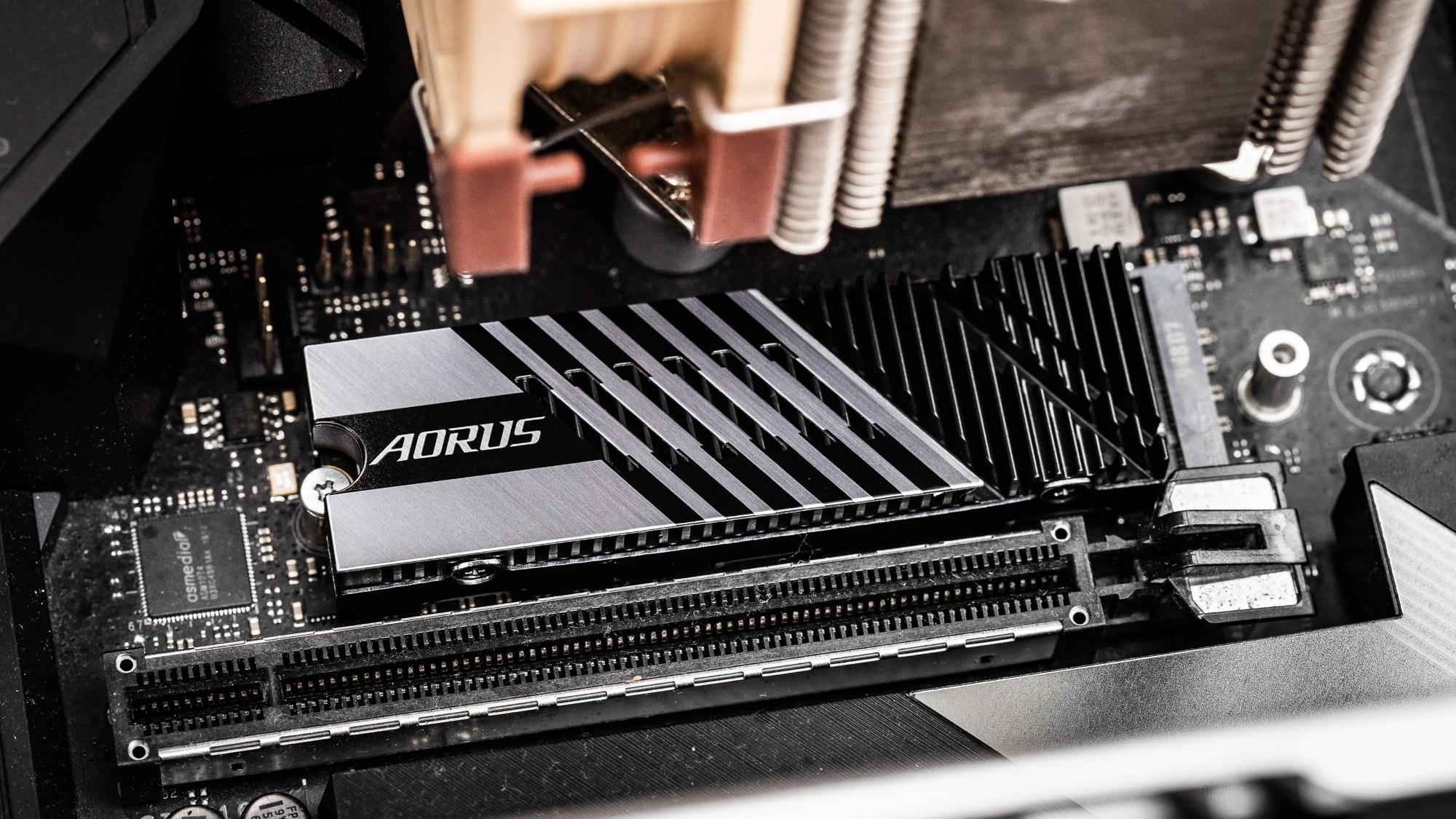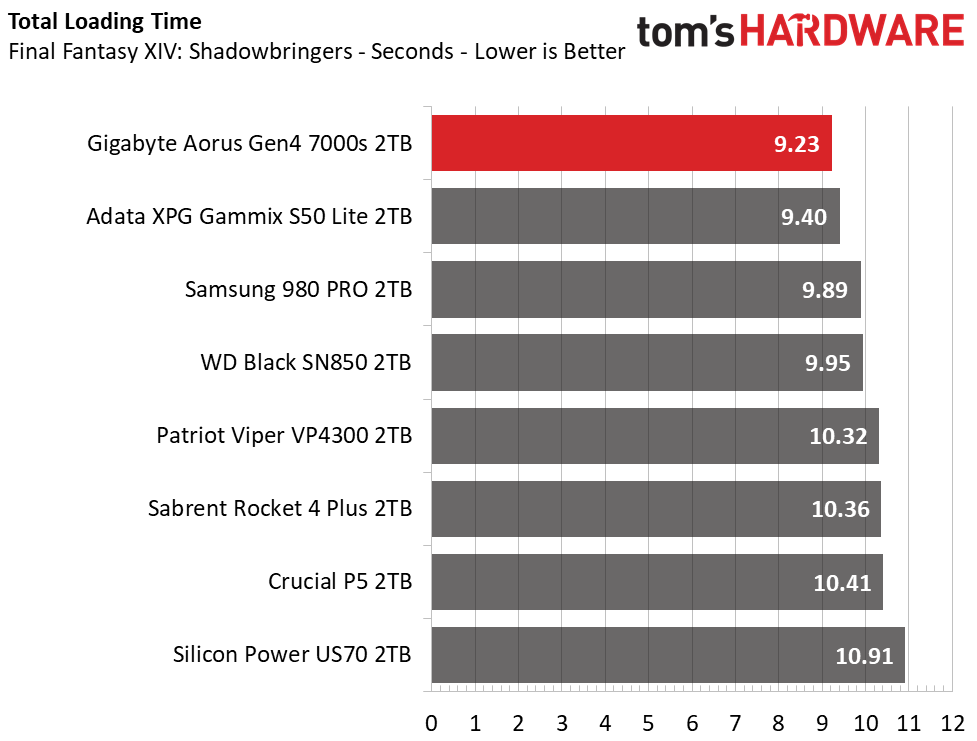Why you can trust Tom's Hardware
Performance Results for Gigabyte Aorus Gen4 7000s 2TB
Rating: 4.5 (Editor's Choice)
Verdict: Gigabyte Aorus Gen4 7000s 2TB is a high-performance, premium-priced M.2 NVMe SSD that keeps cool under any workload due to its sleek pre-installed heatsink.
FOR
+ Competitive performance
+ Attractive design
+ Effective cooling
+ AES 256-bit encryption
+ 5-year warranty and high endurance ratings
AGAINST
- Costly
Comparison Products for Gigabyte Aorus Gen4 7000s 2TB
The Aorus Gen4 7000s has some tough competition. . We are comparing it against Samsung’s 980 Pro, WD’s Black SN850, and the Sabrent Rocket 4 Plus as well as the Patriot Viper VP4300. For some cheaper competition, we included a Silicon Power US70, Adata XPG Gammix S50 Lite, and Crucial P5.
Get Tom's Hardware's best news and in-depth reviews, straight to your inbox.
Game Scene Loading - Final Fantasy XIV
Final Fantasy XIV Shadowbringers is a free real-world game benchmark that easily and accurately compares game load times without the inaccuracy of using a stopwatch.
Gigabyte’s Aorus Gen4 7000s scores top marks in this game load test, surpassing even that of Adata's XPG Gammix S50 Lite. At a total time of 9.23 seconds, it outpaces Samsung’s 980 Pro and WD’s SN850 by roughly 7 percent.
Transfer Rates – DiskBench
We use the DiskBench storage benchmarking tool to test file transfer performance with a custom dataset. We copy a 50GB dataset including 31,227 files of various types, like pictures, PDFs, and videos to a new folder and then follow up with a reading test of a newly-written 6.5GB zip file.
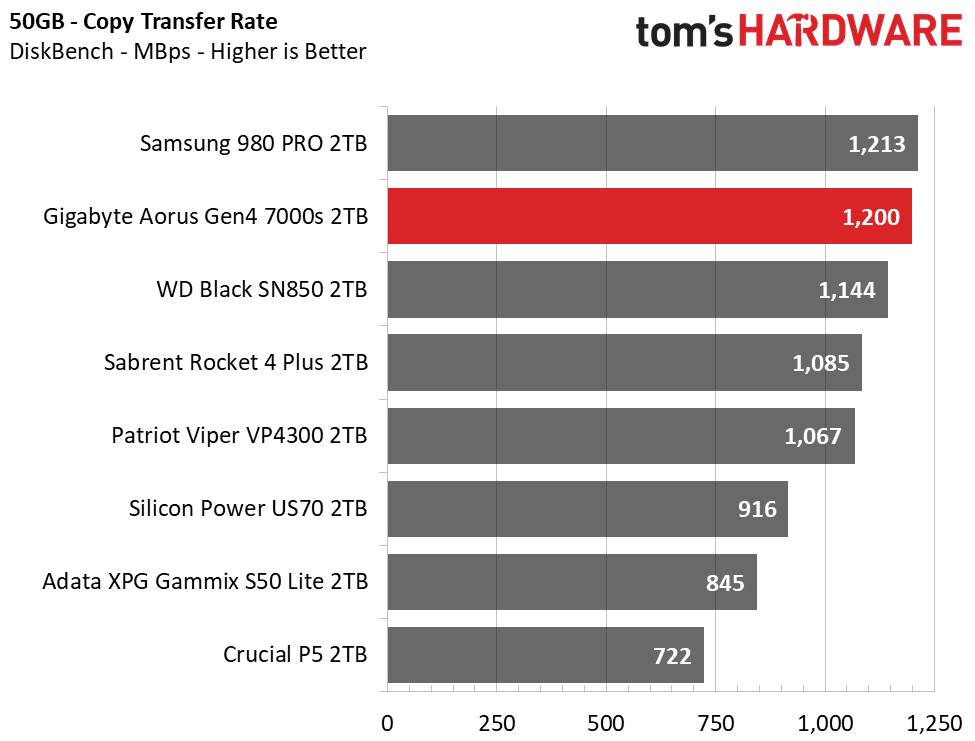
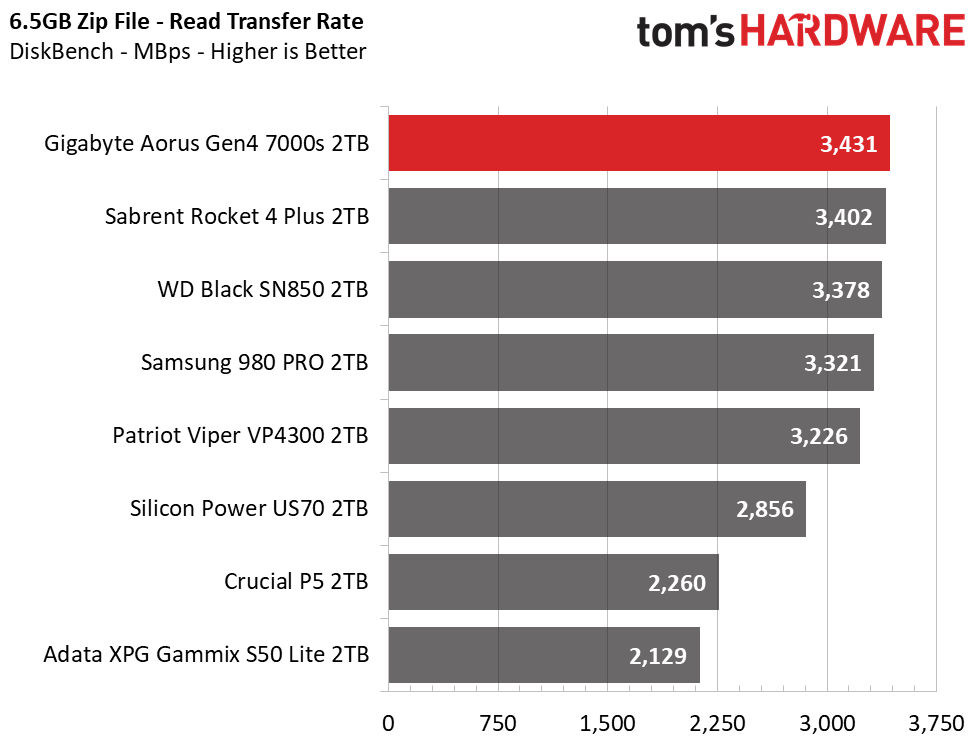
In copying the dataset, the Aorus Gen4 7000s scored very fast results. Not only did it manage to copy it nearly as fast as the Samsung 980 Pro, but it also read back the large zip file over 100MBps faster, scoring first place in the read test on top.
Trace Testing – PCMark 10 Storage Test
PCMark 10 is a trace-based benchmark that uses a wide-ranging set of real-world traces from popular applications and everyday tasks to measure the performance of storage devices. The quick benchmark is more relatable to those who use their PCs for leisure or basic office work, while the full benchmark relates more to power users.
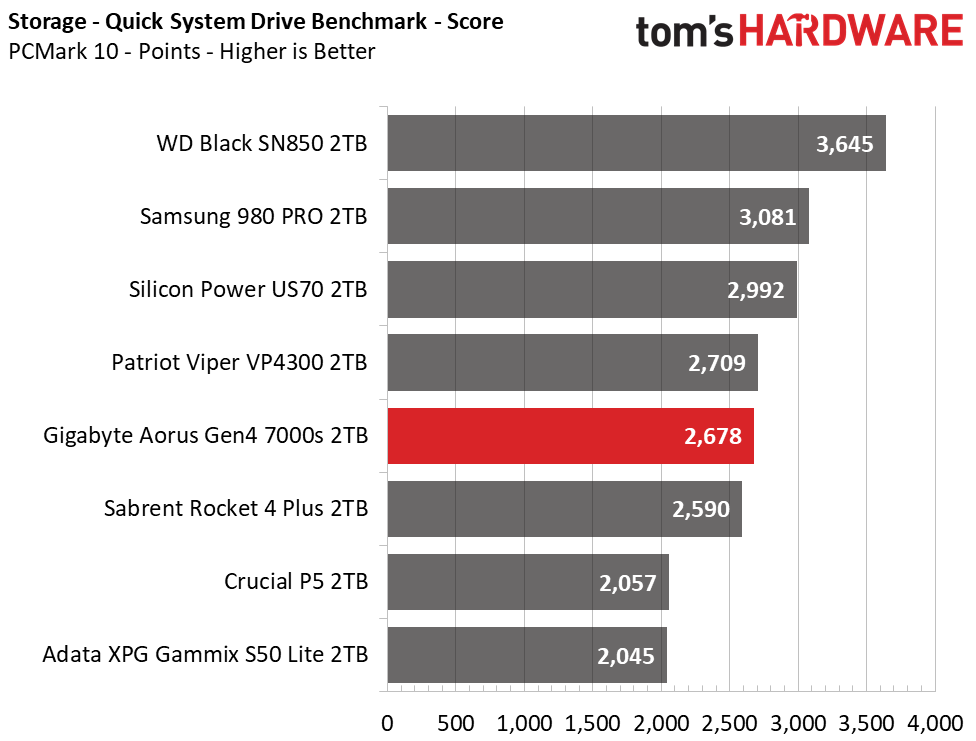
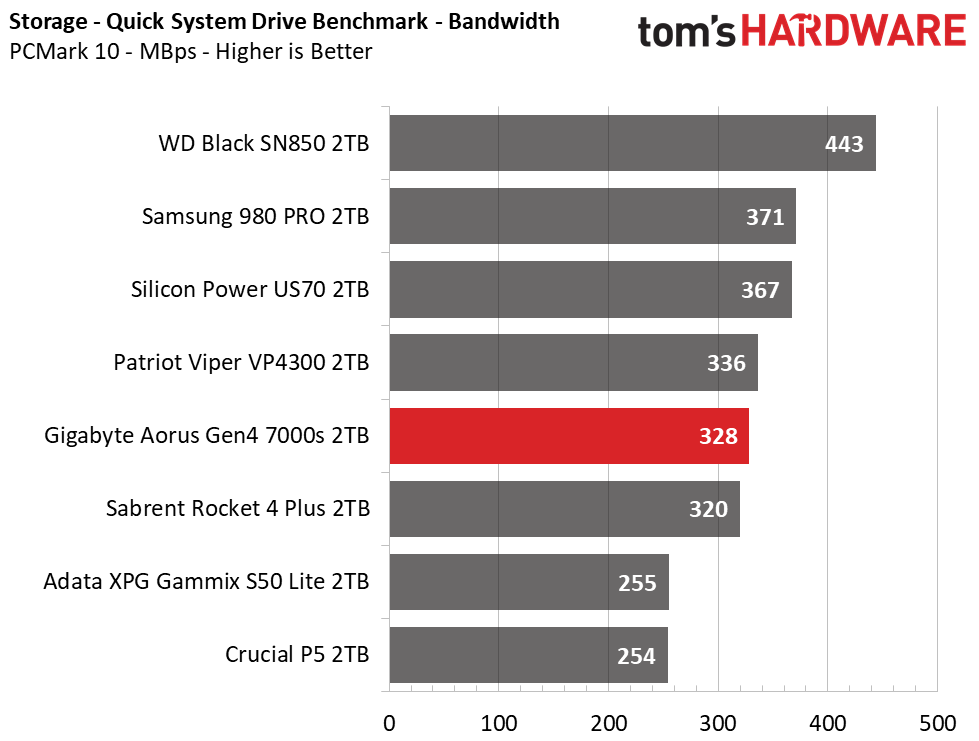
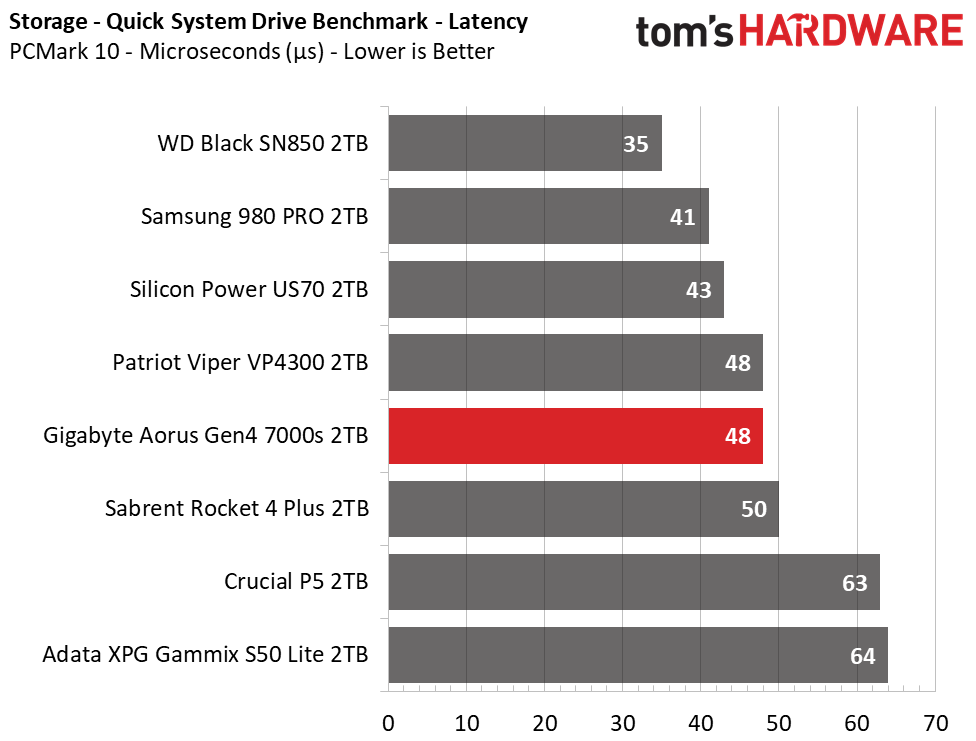
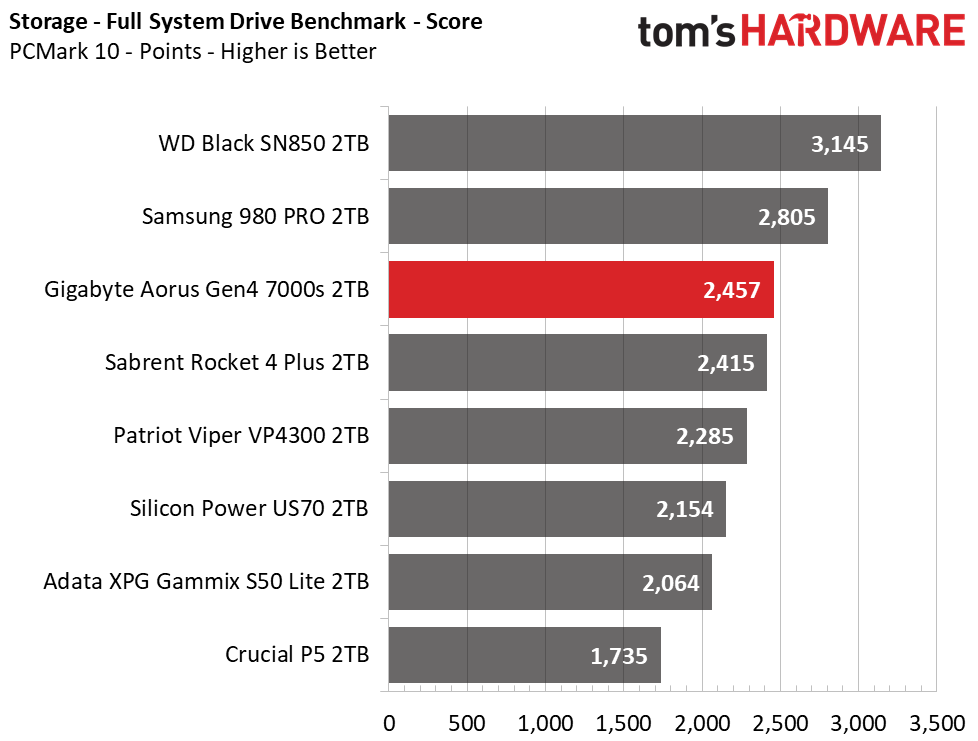
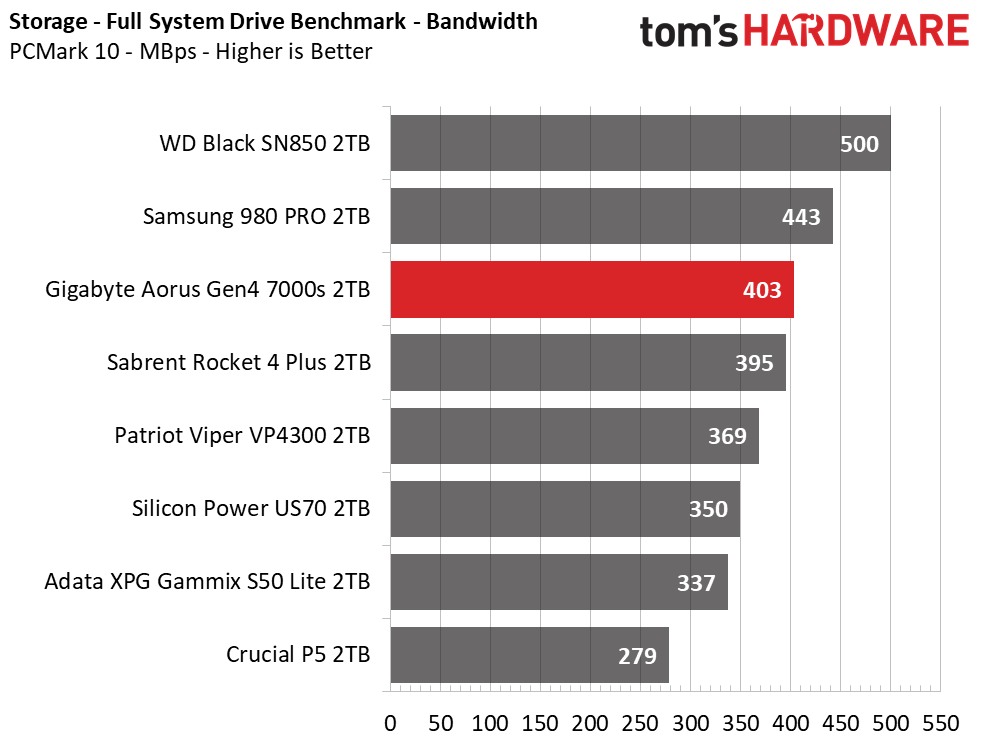
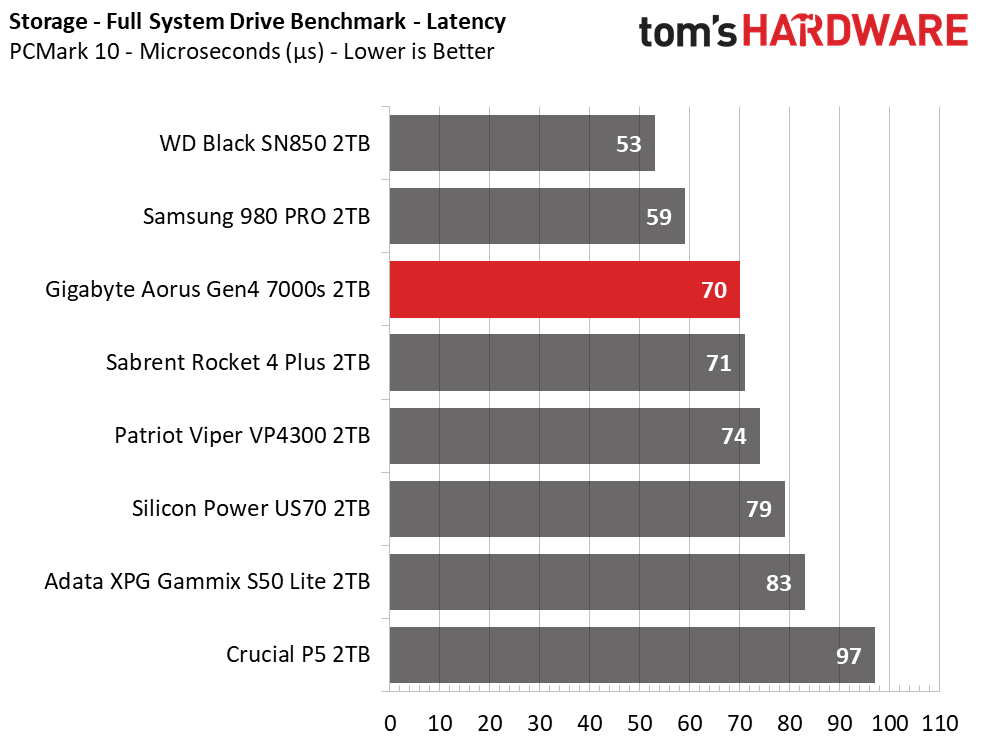
When benchmarked in PCMark 10, the Gigabyte Aorus delivered respectable scores, outperforming the Patriot Viper VP4300 and Sabrent Rocket 4 Plus in the Full System Drive benchmark, but it trailed both the Samsung and WD.
Synthetic Testing - ATTO / iometer
iometer is an advanced and highly-configurable storage benchmarking tool while ATTO is a simple and free application that SSD vendors commonly use to assign sequential performance specifications to their products. Both of these tools give us insight into how the device handles different file sizes.
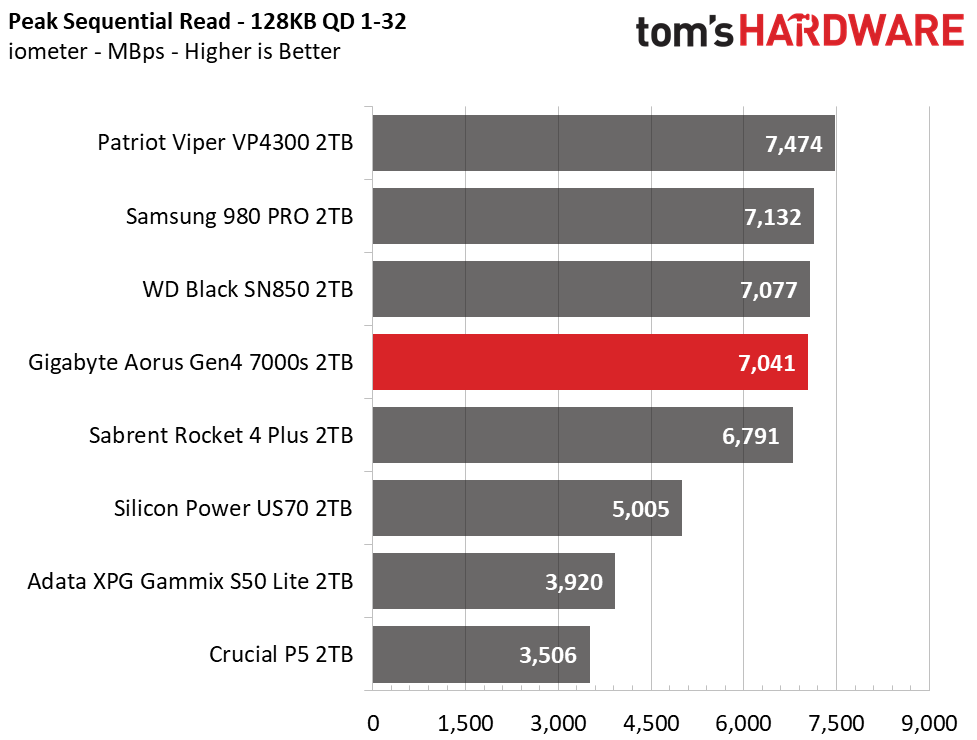
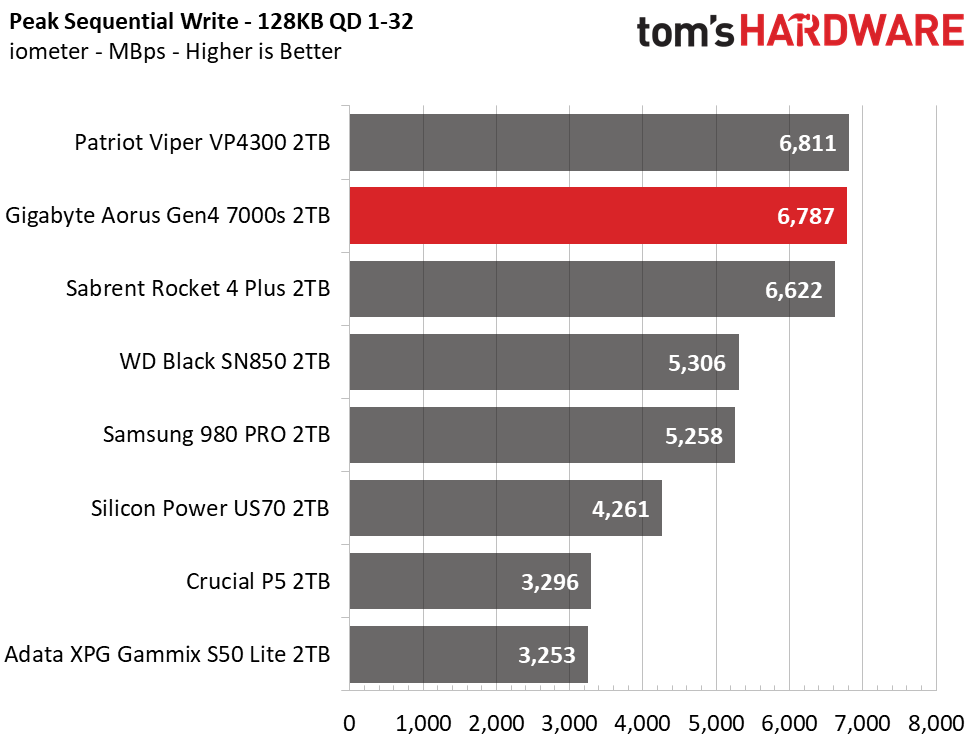
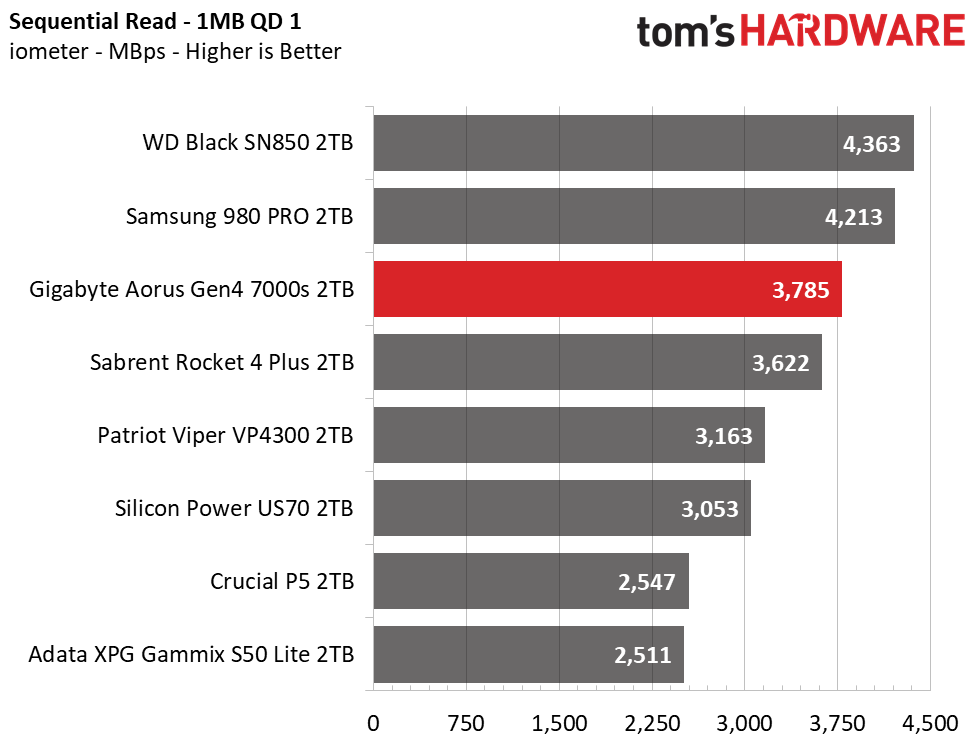
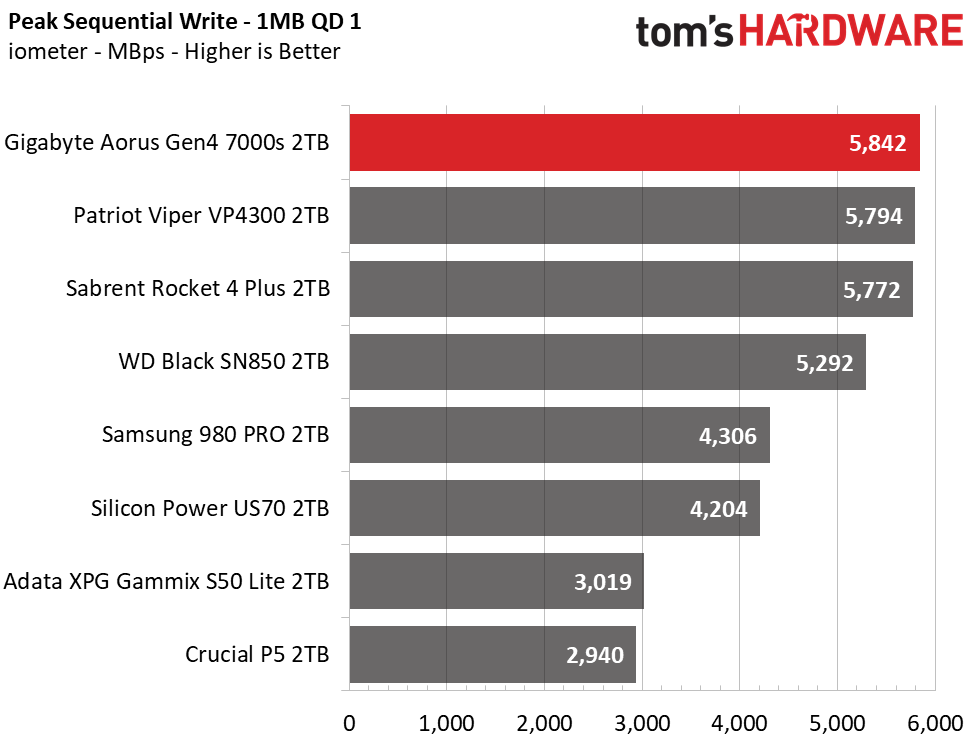
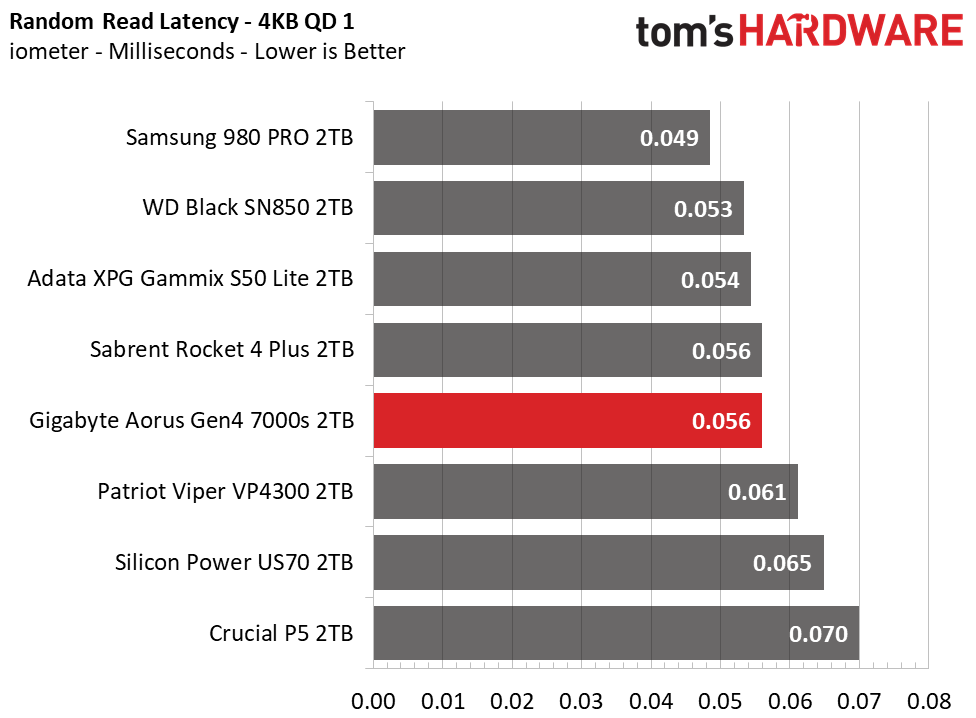
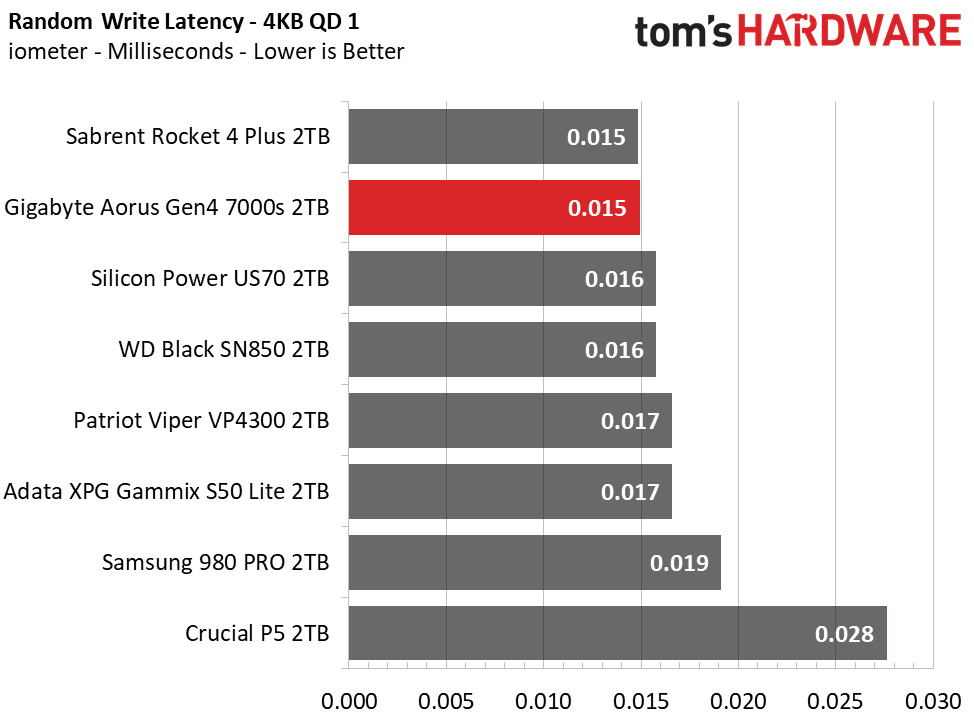
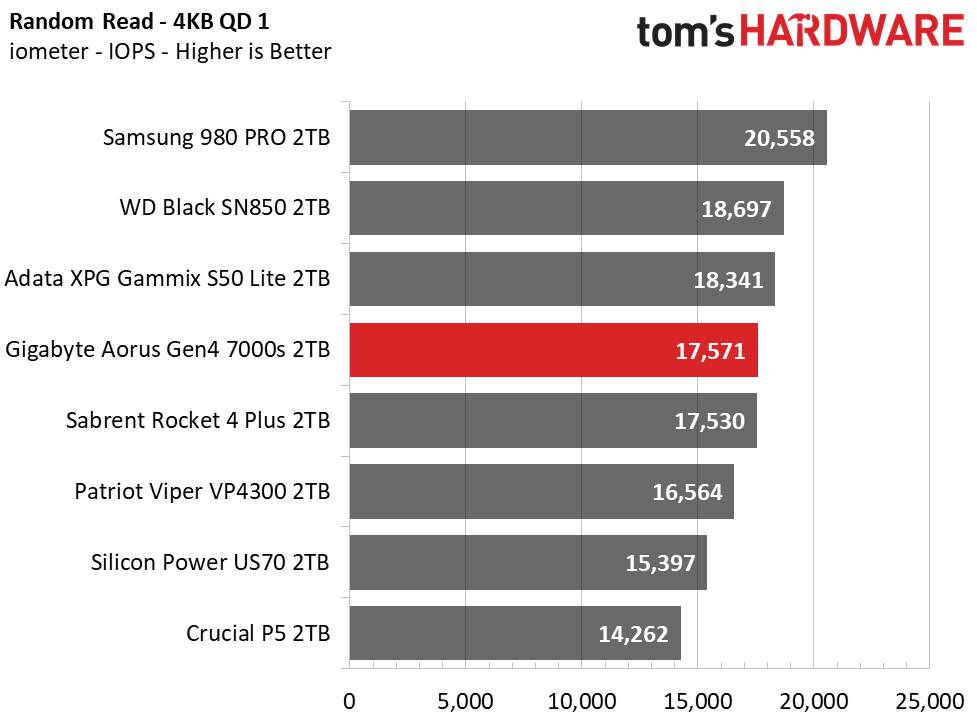
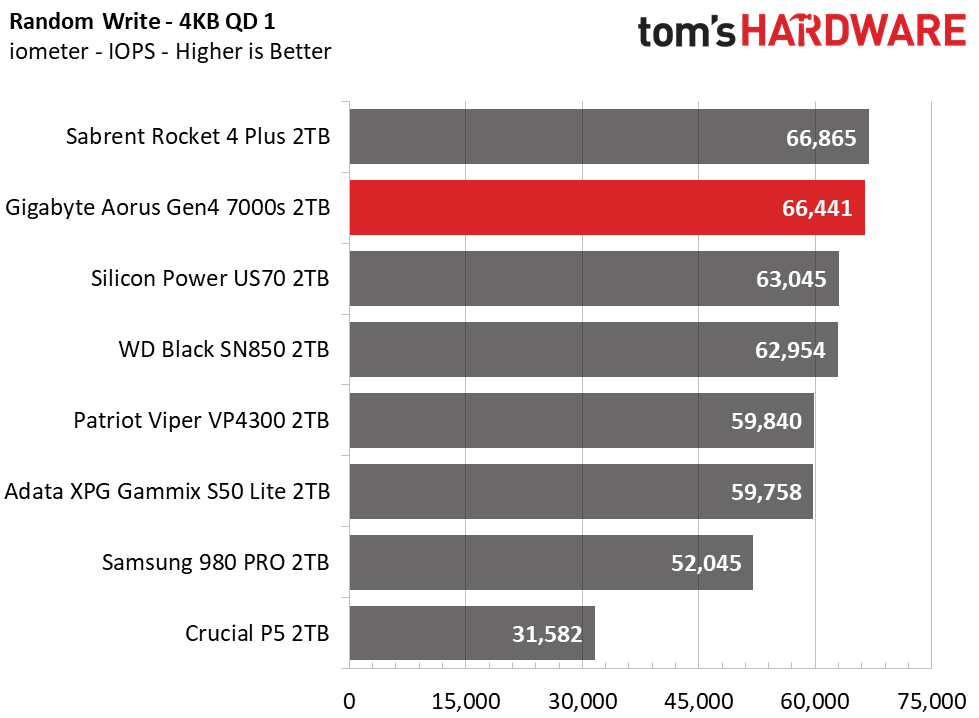
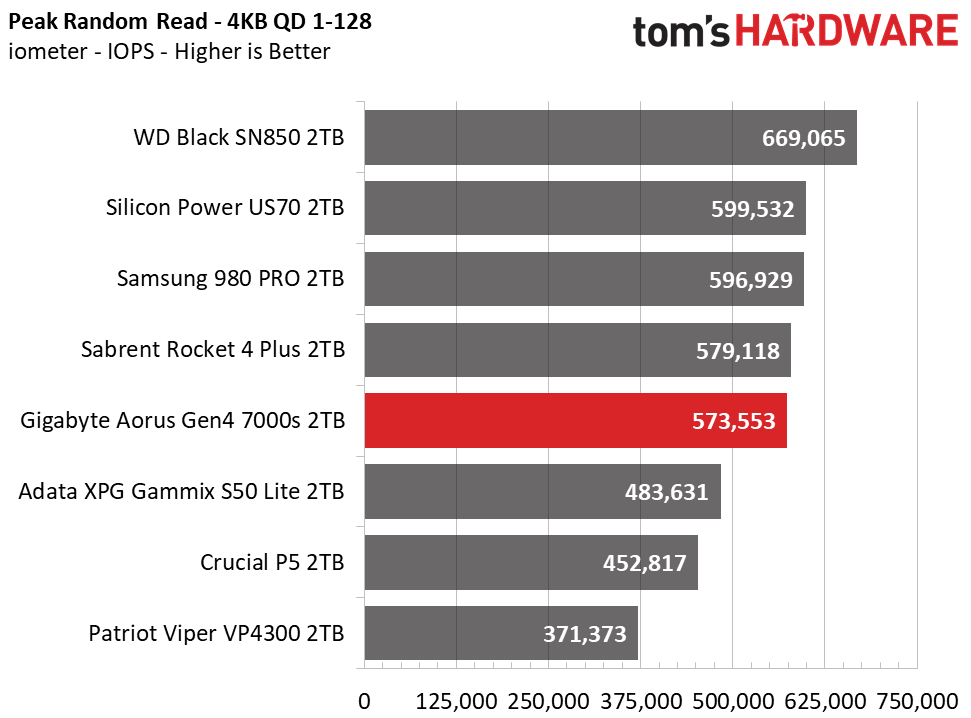
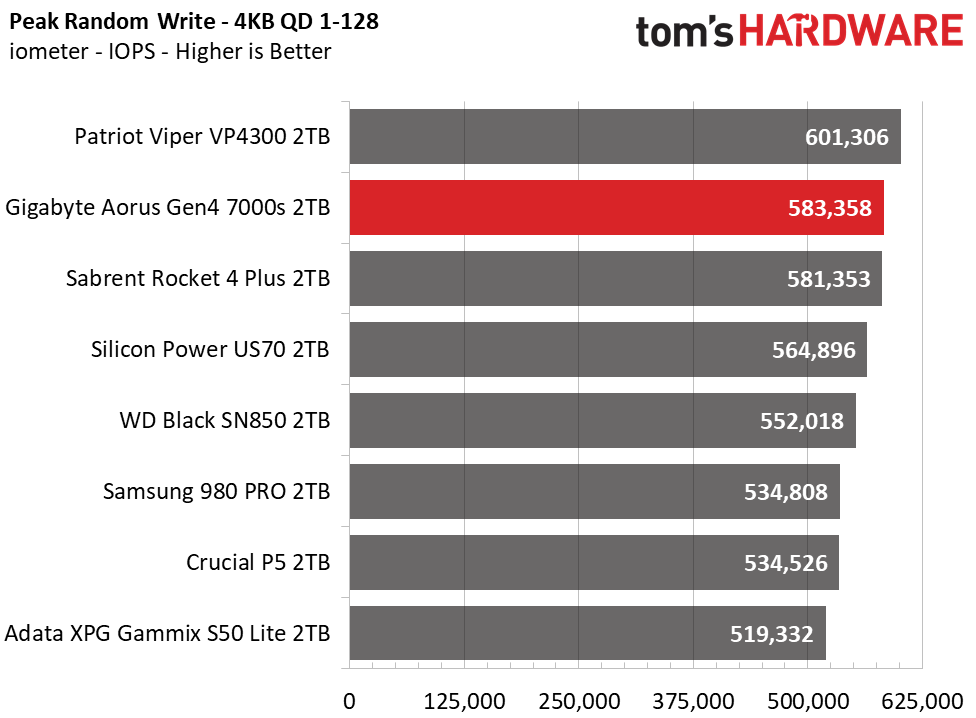
Sequential read/write performance is very good across all block sizes based on the Arous Gen4 7000s ATTO results. At a QD of 1 and 1MB block size, the Gen4 7000s reads much faster than the InnoGrit-powered Viper VP4300, but lags behind the Samsung and WD. When writing, however, it scores top marks, writing at roughly 5,850 MBps. In terms of its random responsiveness, the Gigabyte Aorus Gen4 7000s is just as fast as the Rocket 4 Plus, but not quite up to snuff when compared to the Samsung, WD, or even the Adata at a QD of 1.
Sustained Write Performance and Cache Recovery
Official write specifications are only part of the performance picture. Most SSDs implement a write cache, which is a fast area of (usually) pseudo-SLC programmed flash that absorbs incoming data. Sustained write speeds can suffer tremendously once the workload spills outside of the cache and into the "native" TLC or QLC flash.
We use iometer to hammer the SSD with sequential writes for 15 minutes to measure both the size of the write cache and performance after the cache is saturated. We also monitor cache recovery via multiple idle rounds.
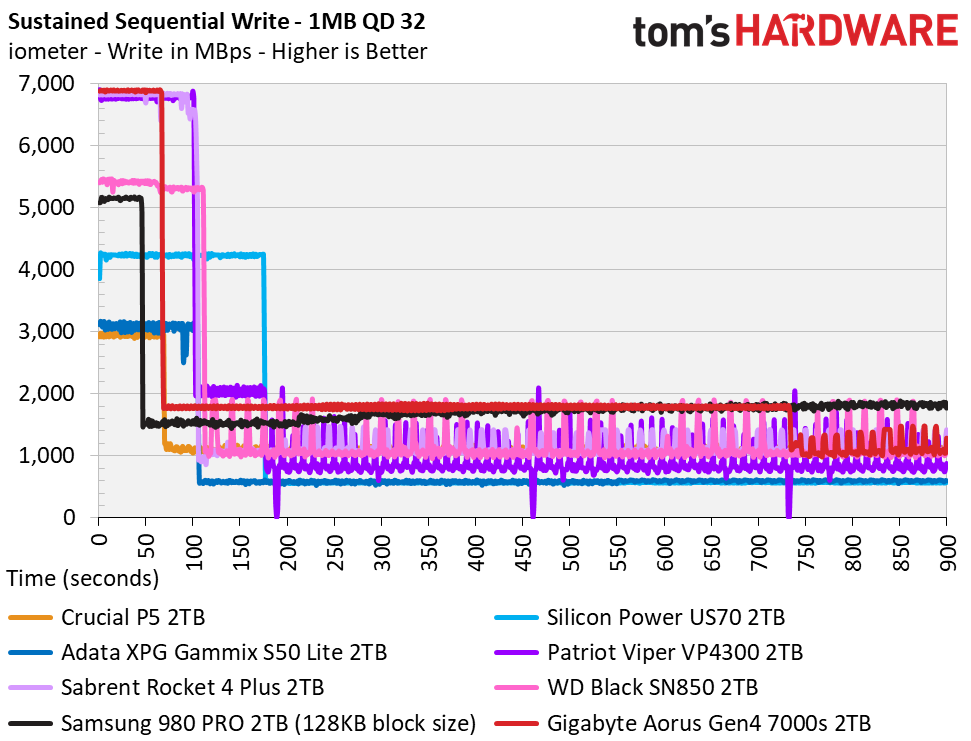
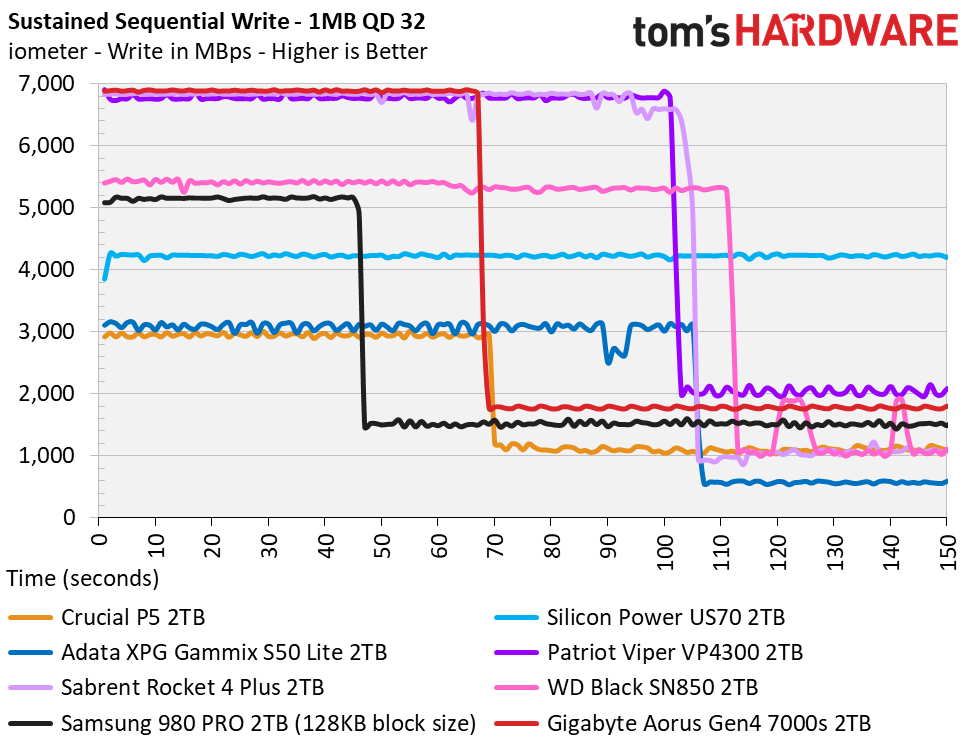
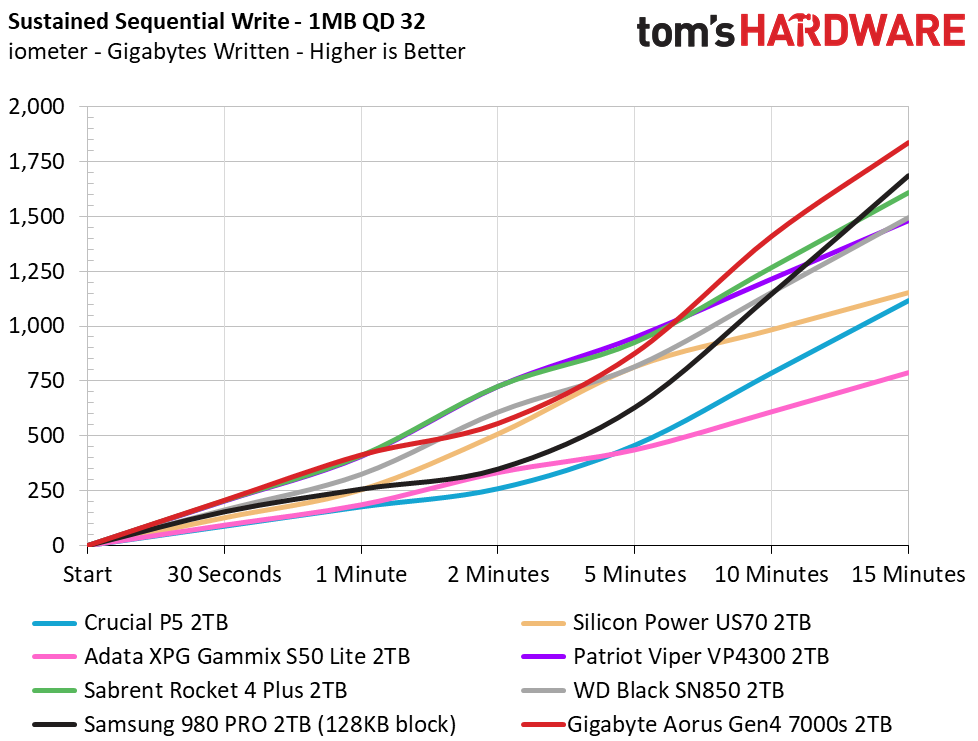
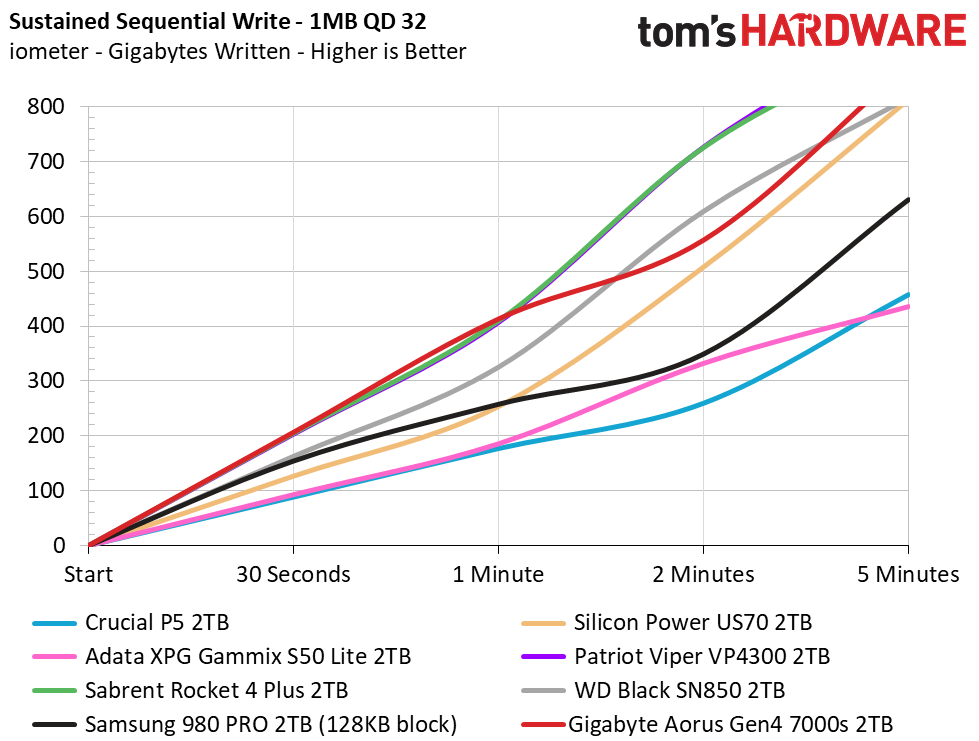
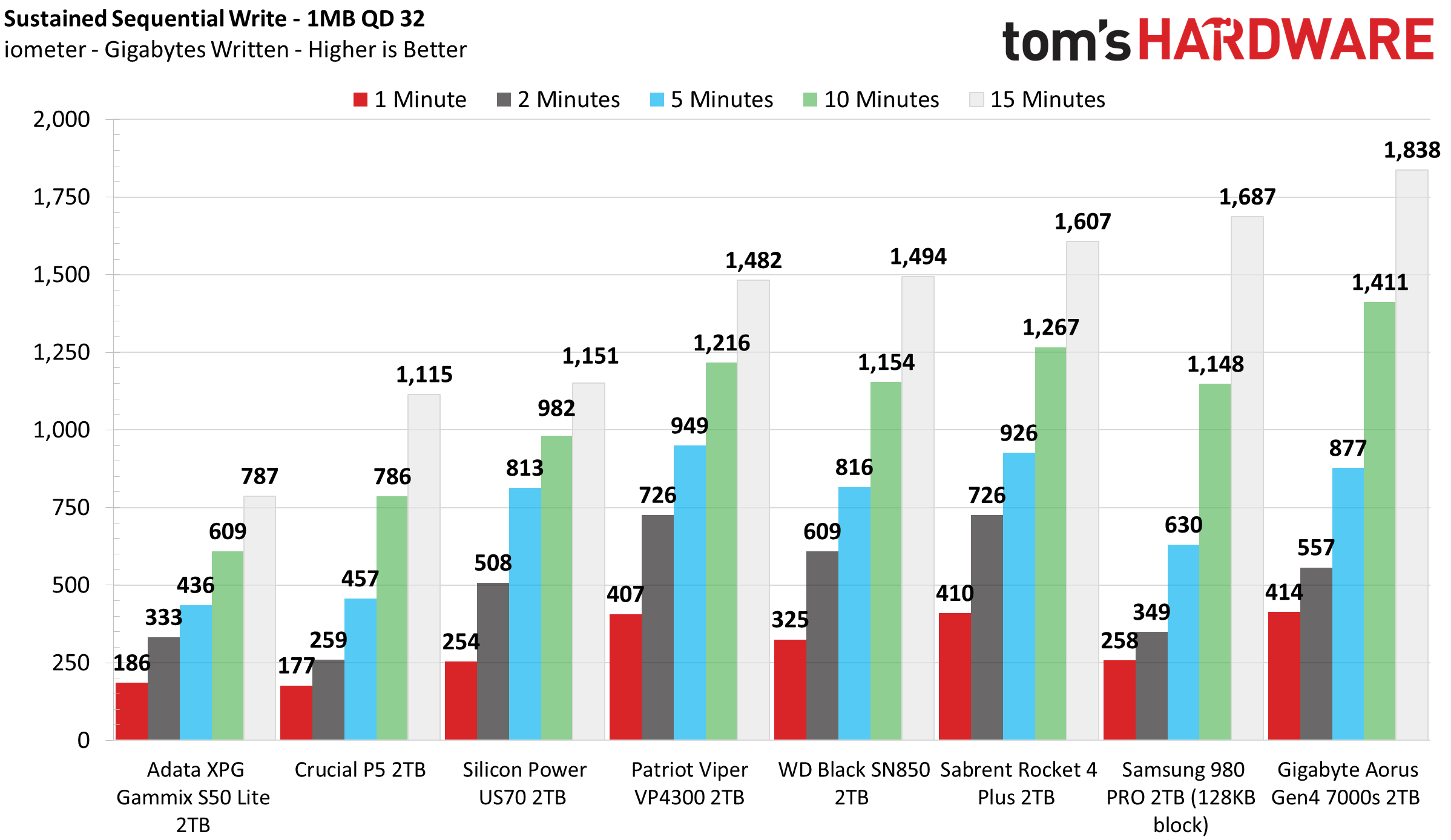
Gigabyte’s Aorus Gen4 7000s is one of the fastest filling SSD’s we’ve had our hands-on. While it doesn’t show a full disk dynamic cache, its seemingly more conservative behavior enables fast performance. When tested, the SSD wrote 464GB of data at a speed of 6.9 GBps before degrading to 1.8GBps for another 1.18TB before again degrading to a final 1,150 MBps average for the remainder of the test. SLC cache recovers at a rate of roughly 88GB per 5 minutes.
Power Consumption and Temperature
We use the Quarch HD Programmable Power Module to gain a deeper understanding of power characteristics. Idle power consumption is an important aspect to consider, especially if you're looking for a laptop upgrade. Some SSDs can consume watts of power at idle while better-suited ones sip just milliwatts.
Average workload power consumption and max consumption are two other aspects of power consumption, but performance-per-watt is more important. A drive might consume more power during any given workload, but accomplishing a task faster allows the drive to drop into an idle state more quickly, ultimately saving energy.
We also monitor the drive’s temperature via the S.M.A.R.T. data and an IR thermometer to see when (or if) thermal throttling kicks in and how it impacts performance. Bear in mind that results will vary based on the workload and ambient air temperature.
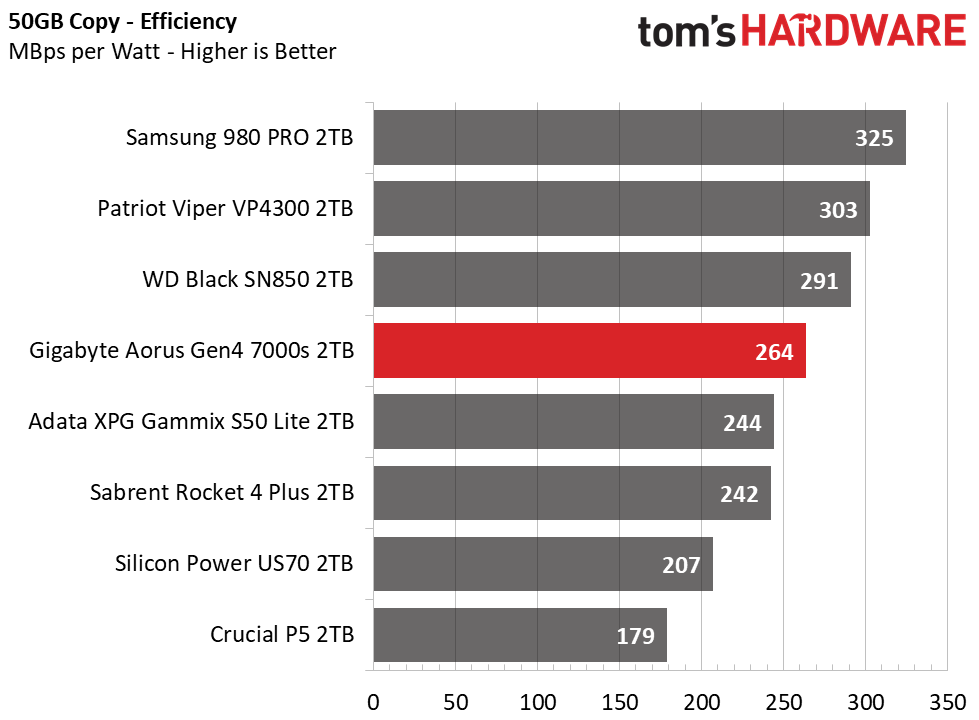
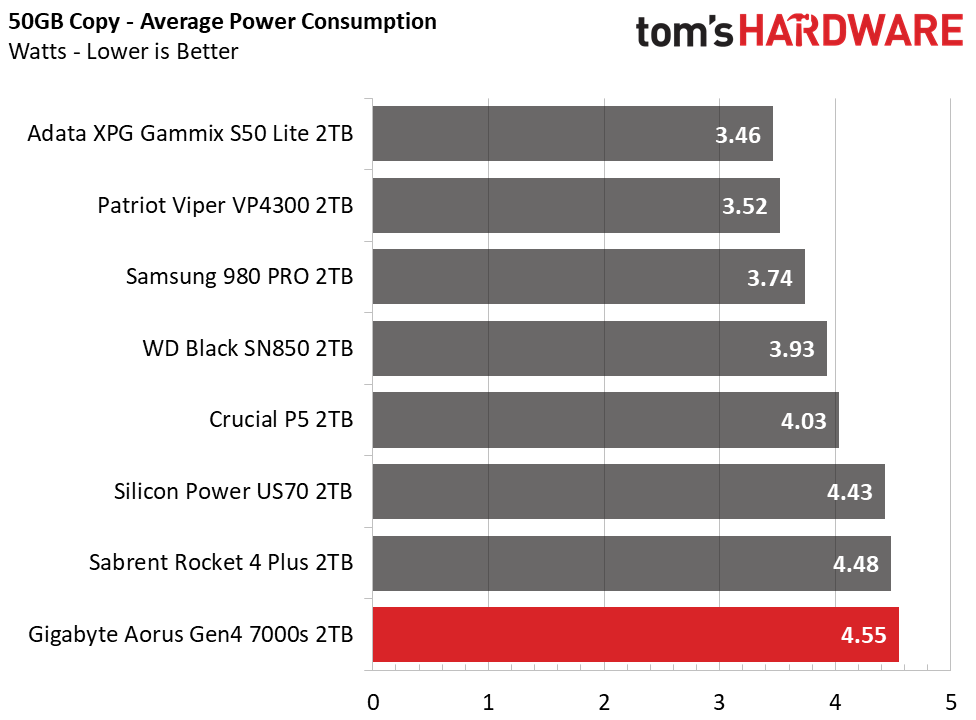
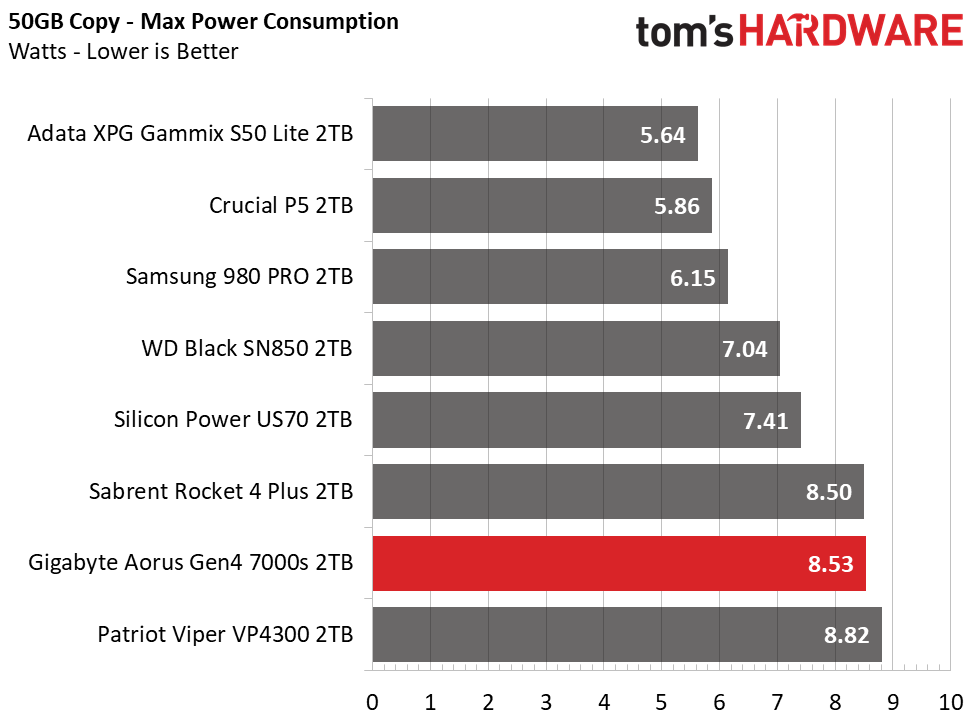
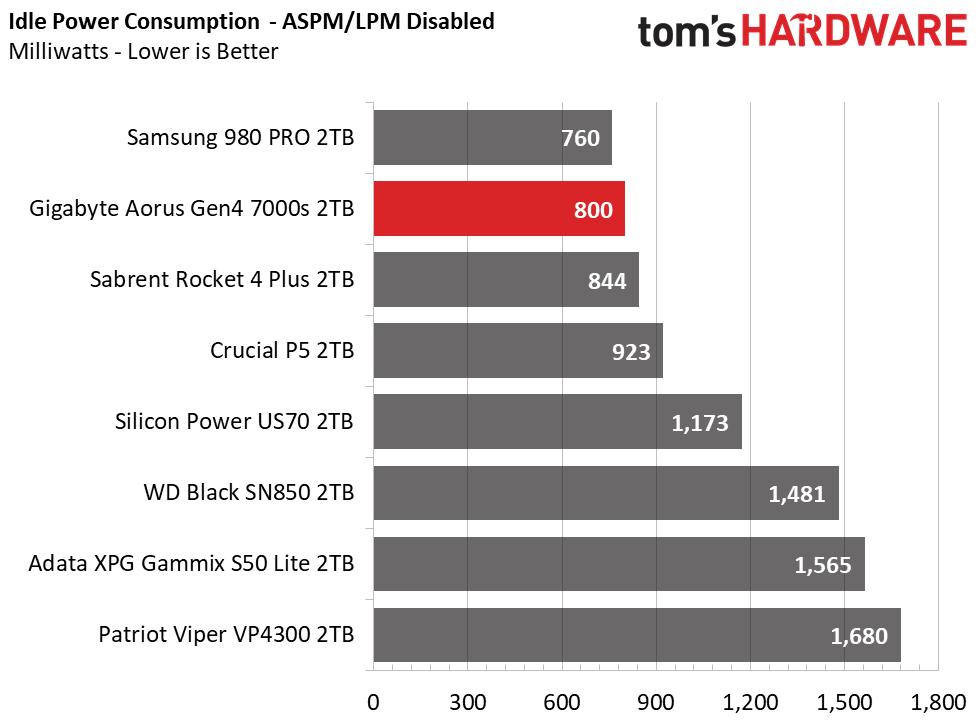
Gigabyte’s Aorus Gen4 7000s runs more efficiently than the Rocket 4 Plus, but trails the Samsung, WD, and Patriot Viper’s scores due to it gulping down the most power on average, with peak power consumption pegging 8.5 watts. At idle, power consumption is well regulated at 800mW, second-lowest to the Samsung 980 Pro.
At idle the SSD measures 40C with no airflow and operating as our operating system drive. After filling the Aorus Gen4 7000s to half its capacity, the surface temperature measured 78C with no thermal throttling taking place.
MORE: Best SSDs
MORE: How We Test HDDs And SSDs
MORE: All SSD Content

Sean is a Contributing Editor at Tom’s Hardware US, covering storage hardware.
-
waltc3 Don't quite get the "costly" remark...the GB 1TB is $10 more than the latest Amazon pricing for the 980 Pro 1TB; the 2TB 980 Pro is via Amazon $10 more than this GB. I don't see how "costly" qualifies. For its class of performance, cost seems right on the nose--but of course something slower will cost less, etc.Reply -
Makaveli "Gigabyte backs the Aorus Gen4 7000s with a 5-year warranty and each comes with respectable write endurance ratings - up to 700TB per 1TB in capacity. Such high endurance is thanks to Phison’s fourth-generation LDPC and RAID ECC, wear leveling, a bit of over-provisioning."Reply
Endurance has dropped on all these E18 drives compared to the E16 ones.
The E16 based drives at 1TB do 1,800 TBW which is more than the 2TB drive on E18. And E16 based 2TB drive does 3,600 TBW. And i've yet to see anyone ask them or get an explanation on why the endurance rating in less on new controller.
"But, even so, most consumers and prosumers will never come near to wearing out the Gen4 7000s with its endurance rating tipping the scales at 1.4PB at 2TB. "
That is a type-o there are no consumer drives with 1.4 PB of endurance that should be 1.4 TB
Also wonder if its just firmware tweaking on this drive that has it producing abit better scores than other E18 based drives. -
seanwebster Reply
Overall, I see both as quite costly in terms of price per GB.waltc3 said:Don't quite get the "costly" remark...the GB 1TB is $10 more than the latest Amazon pricing for the 980 Pro 1TB; the 2TB 980 Pro is via Amazon $10 more than this GB. I don't see how "costly" qualifies. For its class of performance, cost seems right on the nose--but of course something slower will cost less, etc.
It's probably because the flash runs faster, thus having a detrimental effect on endurance, or maybe just that Phison's sales teams are not offering that sort of contract anymore with this generation. Also worth noting, last gen came with BiCS flash, the current generation of E18 SSDs all come with Micron's 96L TLC. So, it may be even farther up the chain. Though, the newer flash will be out shortly. A few E18-based SSDs with Micron's 176L TLC are in the works.Makaveli said:Endurance has dropped on all these E18 drives compared to the E16 ones. The E16 based drives at 1TB do 1,800 TBW which is more than the 2TB drive on E18. And E16 based 2TB drive does 3,600 TBW. And i've yet to see anyone ask them or get an explanation on why the endurance rating in less on new controller.
Makaveli said:"But, even so, most consumers and prosumers will never come near to wearing out the Gen4 7000s with its endurance rating tipping the scales at 1.4PB at 2TB. "That is a type-o there are no consumer drives with 1.4 PB of endurance that should be 1.4 TB
It's not a typo. It has 1.4 petabytes of endurance, equal to 1,400 terabytes. I don't think any SSD has such low endurance as 1.4TB. Even consumer SSDs from 10 years ago came with 72TB endurance ratings.
I highly suspect so, too. More so now that I received another new batch of E18 drives this week and just started testing them today. They are also exhibiting similar performance improvement from what I can tell thus far.waltc3 said:Also wonder if its just firmware tweaking on this drive that has it producing abit better scores than other E18 based drives.
I still am having SLC cache measuring issues, though. Whenever I run the high QD sequential write test to these SSDs, once the SMART reports 70C, the drives pull back to that slower 1.8 GBps write speed around the 200-300GB mark. (This isn't the case when you do multiple drag and drops in real-world use in Windows. ) -
Makaveli Replyseanwebster said:Overall, I see both as quite costly in terms of price per GB.
It's probably because the flash runs faster, thus having a detrimental effect on endurance, or maybe just that Phison's sales teams are not offering that sort of contract anymore with this generation. Also worth noting, last gen came with BiCS flash, the current generation of E18 SSDs all come with Micron's 96L TLC. So, it may be even farther up the chain. Though, the newer flash will be out shortly. A few E18-based SSDs with Micron's 176L TLC are in the works.
It's not a typo. It has 1.4 petabytes of endurance, equal to 1,400 terabytes. I don't think any SSD has such low endurance as 1.4TB. Even consumer SSDs from 10 years ago came with 72TB endurance ratings.
I highly suspect so, too. More so now that I received another new batch of E18 drives this week and just started testing them today. They are also exhibiting similar performance improvement from what I can tell thus far.
I still am having SLC cache measuring issues, though. Whenever I run the high QD sequential write test to these SSDs, once the SMART reports 70C, the drives pull back to that slower 1.8 GBps write speed around the 200-300GB mark. (This isn't the case when you do multiple drag and drops in real-world use in Windows. )
Sorry yes you are correct i'm not use to see it written as 1.4PB on the consumer drives that does equal 1400 TBW.
I have been waiting to see the drives using Micron 176L TLC so will be keeping an eye on that.
I've been disappointed with some of the newer drives having very small SLC caches. The E16 Corsair drive i'm using has about a 333GB SLC cache. While the new E18 Corsair drive its smaller. And this seem to very per manufacturer.
Looking forward to more of your reviews and numbers. -
derekullo ReplyMakaveli said:"Gigabyte backs the Aorus Gen4 7000s with a 5-year warranty and each comes with respectable write endurance ratings - up to 700TB per 1TB in capacity. Such high endurance is thanks to Phison’s fourth-generation LDPC and RAID ECC, wear leveling, a bit of over-provisioning."
Endurance has dropped on all these E18 drives compared to the E16 ones.
The E16 based drives at 1TB do 1,800 TBW which is more than the 2TB drive on E18. And E16 based 2TB drive does 3,600 TBW. And i've yet to see anyone ask them or get an explanation on why the endurance rating in less on new controller.
"But, even so, most consumers and prosumers will never come near to wearing out the Gen4 7000s with its endurance rating tipping the scales at 1.4PB at 2TB. "
That is a type-o there are no consumer drives with 1.4 PB of endurance that should be 1.4 TB
Also wonder if its just firmware tweaking on this drive that has it producing abit better scores than other E18 based drives.
A 2 terabyte ssd with 1.4 terabytes of write endurance.
Also known as a 1.4 terabyte SSD-R :p -
Sleepy_Hollowed Hm... were it not for the current increase in prices when availability drops, if I can find these at the prices listed when that happens, that'd OK pricing.Reply
Either would be a nice game drive honestly, not so much an OS + game drive if you do other stuff on the background.
If gigabyte keeps up with the firmware updates for security for those 5 years, then it's a decent drive. Not that Windows supports bitlocker hardware encryption anymore, but for other operating systems hardware AES-256 is mighty fine.
